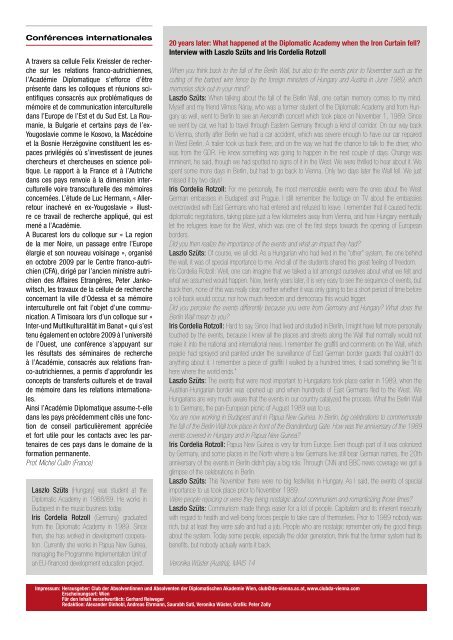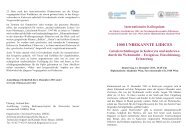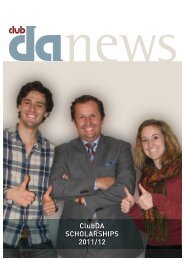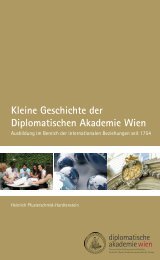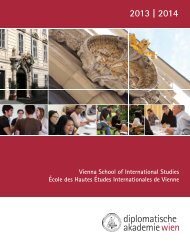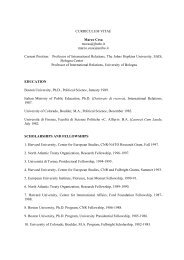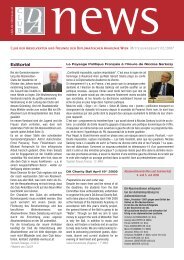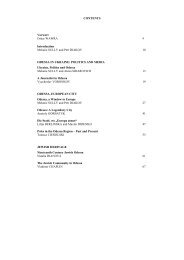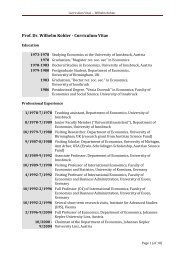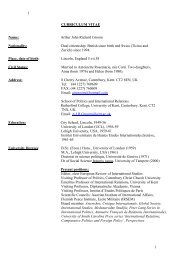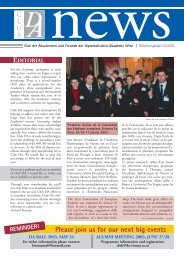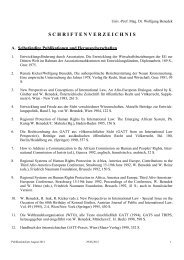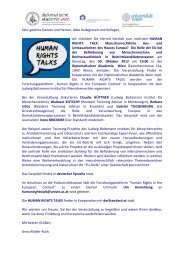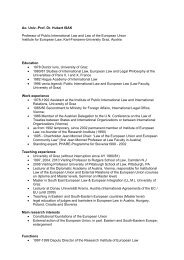Visit our new website: www.clubda-vienna.com - Diplomatic ...
Visit our new website: www.clubda-vienna.com - Diplomatic ...
Visit our new website: www.clubda-vienna.com - Diplomatic ...
Create successful ePaper yourself
Turn your PDF publications into a flip-book with our unique Google optimized e-Paper software.
Conférences internationales<br />
A travers sa cellule Felix Kreissler de recherche<br />
sur les relations franco-autrichiennes,<br />
l’Académie Diplomatique s’efforce d’être<br />
présente dans les colloques et réunions scientifiques<br />
consacrés aux problématiques de<br />
mémoire et de <strong>com</strong>munication interculturelle<br />
dans l’Europe de l’Est et du Sud Est. La Roumanie,<br />
la Bulgarie et certains pays de l’ex-<br />
Yougoslavie <strong>com</strong>me le Kosovo, la Macédoine<br />
et la Bosnie Herzégovine constituent les espaces<br />
privilégiés où s’investissent de jeunes<br />
chercheurs et chercheuses en science politique.<br />
Le rapport à la France et à l’Autriche<br />
dans ces pays renvoie à la dimension interculturelle<br />
voire transculturelle des mémoires<br />
concernées. L’étude de Luc Hermann, « Allerret<strong>our</strong><br />
inachevé en ex-Yougoslavie » illustre<br />
ce travail de recherche appliqué, qui est<br />
mené a l’Académie.<br />
A Bucarest lors du colloque sur « La region<br />
de la mer Noire, un passage entre l’Europe<br />
élargie et son nouveau voisinage », organisé<br />
en octobre 2009 par le Centre franco-autrichien<br />
(CFA), dirigé par l’ancien ministre autrichien<br />
des Affaires Etrangères, Peter Jankowitsch,<br />
les travaux de la cellule de recherche<br />
concernant la ville d’Odessa et sa mémoire<br />
interculturelle ont fait l’objet d’une <strong>com</strong>munication.<br />
A Timisoara lors d’un colloque sur «<br />
Inter-und Multikulturalität im Banat » qui s’est<br />
tenu également en octobre 2009 à l’université<br />
de l’Ouest, une conférence s’appuyant sur<br />
les résultats des séminaires de recherche<br />
à l’Académie, consacrés aux relations franco-autrichiennes,<br />
a permis d’approfondir les<br />
concepts de transferts culturels et de travail<br />
de mémoire dans les relations internationales.<br />
Ainsi l’Académie Diplomatique assume-t-elle<br />
dans les pays précédemment cités une fonction<br />
de conseil particulièrement appréciée<br />
et fort utile p<strong>our</strong> les contacts avec les partenaires<br />
de ces pays dans le domaine de la<br />
formation permanente.<br />
Prof. Michel Cullin (France)<br />
Laszlo Szüts (Hungary) was student at the<br />
<strong>Diplomatic</strong> Academy in 1988/89. He works in<br />
Budapest in the music business today.<br />
Iris Cordelia Rotzoll (Germany) graduated<br />
from the <strong>Diplomatic</strong> Academy in 1989. Since<br />
then, she has worked in development cooperation.<br />
Currently she works in Papua New Guinea,<br />
managing the Programme Implementation Unit of<br />
an EU-financed development education project.<br />
20 years later: What happened at the <strong>Diplomatic</strong> Academy when the Iron Curtain fell?<br />
Interview with Laszlo Szüts and Iris Cordelia Rotzoll<br />
When you think back to the fall of the Berlin Wall, but also to the events prior to November such as the<br />
cutting of the barbed wire fence by the foreign ministers of Hungary and Austria in June 1989, which<br />
memories stick out in y<strong>our</strong> mind?<br />
Laszlo Szüts: When talking about the fall of the Berlin Wall, one certain memory <strong>com</strong>es to my mind.<br />
Myself and my friend Vilmos Náray, who was a former student of the <strong>Diplomatic</strong> Academy and from Hungary<br />
as well, went to Berlin to see an Aerosmith concert which took place on November 1, 1989. Since<br />
we went by car, we had to travel through Eastern Germany through a kind of corridor. On <strong>our</strong> way back<br />
to Vienna, shortly after Berlin we had a car accident, which was severe enough to have <strong>our</strong> car repaired<br />
in West Berlin. A trailer took us back there, and on the way we had the chance to talk to the driver, who<br />
was from the GDR. He k<strong>new</strong> something was going to happen in the next couple of days. Change was<br />
imminent, he said, though we had spotted no signs of it in the West. We were thrilled to hear about it. We<br />
spent some more days in Berlin, but had to go back to Vienna. Only two days later the Wall fell. We just<br />
missed it by two days!<br />
Iris Cordelia Rotzoll: For me personally, the most memorable events were the ones about the West<br />
German embassies in Budapest and Prague. I still remember the footage on TV about the embassies<br />
overcrowded with East Germans who had entered and refused to leave. I remember that it caused hectic<br />
diplomatic negotiations, taking place just a few kilometers away from Vienna, and how Hungary eventually<br />
let the refugees leave for the West, which was one of the first steps towards the opening of European<br />
borders.<br />
Did you then realize the importance of the events and what an impact they had?<br />
Laszlo Szüts: Of c<strong>our</strong>se, we all did. As a Hungarian who had lived in the “other” system, the one behind<br />
the wall, it was of special importance to me. And all of the students shared this great feeling of freedom.<br />
Iris Cordelia Rotzoll: Well, one can imagine that we talked a lot amongst <strong>our</strong>selves about what we felt and<br />
what we assumed would happen. Now, twenty years later, it is very easy to see the sequence of events, but<br />
back then, none of this was really clear, neither whether it was only going to be a short period of time before<br />
a roll-back would occur, nor how much freedom and democracy this would trigger.<br />
Did you perceive the events differently because you were from Germany and Hungary? What does the<br />
Berlin Wall mean to you?<br />
Iris Cordelia Rotzoll: Hard to say. Since I had lived and studied in Berlin, I might have felt more personally<br />
touched by the events, because I k<strong>new</strong> all the places and streets along the Wall that normally would not<br />
make it into the national and international <strong>new</strong>s. I remember the graffiti and <strong>com</strong>ments on the Wall, which<br />
people had sprayed and painted under the surveillance of East German border guards that couldn’t do<br />
anything about it. I remember a piece of graffiti I walked by a hundred times, it said something like “It is<br />
here where the world ends.”<br />
Laszlo Szüts: The events that were most important to Hungarians took place earlier in 1989, when the<br />
Austrian-Hungarian border was opened up and when hundreds of East Germans fled to the West. We<br />
Hungarians are very much aware that the events in <strong>our</strong> country catalyzed the process. What the Berlin Wall<br />
is to Germans, the pan-European picnic of August 1989 was to us.<br />
You are now working in Budapest and in Papua New Guinea. In Berlin, big celebrations to <strong>com</strong>memorate<br />
the fall of the Berlin Wall took place in front of the Brandenburg Gate. How was the anniversary of the 1989<br />
events covered in Hungary and in Papua New Guinea?<br />
Iris Cordelia Rotzoll: Papua New Guinea is very far from Europe. Even though part of it was colonized<br />
by Germany, and some places in the North where a few Germans live still bear German names, the 20th<br />
anniversary of the events in Berlin didn’t play a big role. Through CNN and BBC <strong>new</strong>s coverage we got a<br />
glimpse of the celebrations in Berlin.<br />
Laszlo Szüts: This November there were no big festivities in Hungary. As I said, the events of special<br />
importance to us took place prior to November 1989.<br />
Were people rejoicing or were they being nostalgic about <strong>com</strong>munism and romanticizing those times?<br />
Laszlo Szüts: Communism made things easier for a lot of people. Capitalism and its inherent insecurity<br />
with regard to health and well-being forces people to take care of themselves. Prior to 1989 nobody was<br />
rich, but at least they were safe and had a job. People who are nostalgic remember only the good things<br />
about the system. Today some people, especially the older generation, think that the former system had its<br />
benefits, but nobody actually wants it back.<br />
Veronika Wüster (Austria), MAIS 14<br />
Impressum: Herausgeber: Club der Absolventinnen und Absolventen der Diplomatischen Akademie Wien, club@da-<strong>vienna</strong>.ac.at, <strong>www</strong>.<strong>clubda</strong>-<strong>vienna</strong>.<strong>com</strong><br />
Erscheinungsort: Wien<br />
Für den Inhalt verantwortlich: Gerhard Reiweger<br />
Redaktion: Alexander Dinhobl, Andreas Ehrmann, Saurabh Sati, Veronika Wüster, Grafik: Peter Zolly


